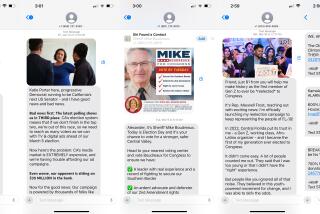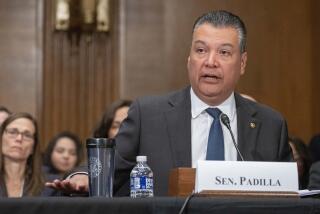Avoiding ‘Junk Mail’ Over the Phone
- Share via
Question: I understand there is a service called Telephone Preference Service in which you can sign up to not receive (as many) telephone solicitations. Who offers this service and how do you get it? Why aren’t consumers made aware of this service? Enclosed is an article that talks a little about it. I think it would be great if your column could tell consumers how to register for TPS, because most consumers hate telemarketing.--G.S.
Answer: What’s to hate? So you’re trying to grill a steak, medium rare, on the patio barbecue, there’s no one else around to answer the phone and by the time you convince the nice caller on the phone that you’re not in the market for a time share in Costa Rica, the steak has climbed off the grill and chased the family cat up a tree.
Alas, yes, telemarketing has the sort of image problem with which a carnival pitchman can empathize, and it worries an industry that is fast to point out that it is a perfectly legitimate enterprise and that--when done judiciously--isn’t as unwelcome by the consumer as it is frequently painted.
And “judiciously” is defined by Laird Wilson, executive director of the Sherman Oaks-based American Telemarketing Assn., as a telemarketing campaign where the list of callees has been carefully screened to confine the calls (as much as possible) to people who have already been customers of the seller in the past or whose demographic profiles indicate that they could logically be expected to have an interest in the product or service being pitched.
“Cold calls are extremely difficult,” Wilson added. “The solution is to zero in on a very specific market.”
You may also be relieved to learn that Wilson isn’t much more enthusiastic about automated telemarketing than we are--where not only are the telephone numbers dialed electronically, randomly and sequentially, but where the sales pitch too is automated via a tape.
“I just don’t believe it’s an approach that can be automated to that extent,” he said. “The dialing itself may be automated, but then when you get a response, you’ve got to have a live operator on the line.”
So what happens when a fully automated sales pitch makes a call and locks into the consumer’s own form of automation, his telephone answering machine? “Since they’re both voice-activated,” Wilson said, “the consumer usually gets a partial, jumbled part of the sales message on his answering machine.”
The Telephone Preference Service that you saw mentioned in the clipping you sent me (from Target Marketing magazine) doesn’t really tell what TPS is all about because Target Marketing is a publication of the Direct Marketing Assn. (DMA), whose membership, naturally, is already intimately familiar with the subject.
But according to Millie Gonzales, a spokesperson for the Direct Marketing Assn. in New York, the Telephone Preference Service is patterned after the older, far better known and popular Mail Preference Service, which was launched by the DMA about 10 years ago. As Gonzales said, it was aimed at “forestalling troublesome government regulations over telemarketing practices. The industry has a real commitment regarding personal privacy concerns and to the principle of self-regulation.”
Consumers not wishing to receive “junk mail” can send their name and address to Mail Preference Service, and the DMA, in turn, circulates this information to its subscribers who are beholden to winnow these names from their mailing lists.
“It works the same with TPS,” Gonzales said. “All they (the callees) have to do is send their name and their telephone number to us, and we’ll circulate them to our subscribers for removal from their calling lists. This is a big help to our subscribers too, since they don’t want to waste dollars on unproductive calls any more than these people want to receive them.”
Letters to both Mail Preference Service and Telephone Preference Service should be addressed to either (or both), c/o the Direct Marketing Assn., 6 East 43rd St., New York, N.Y. 10017.
Of course, this won’t end your mail burden or the unsolicited telephone calls, because not all telemarketing firms subscribe to DMA, but it can reduce both an appreciable degree. While such helpfulness on the part of an organization devoted to mail and telephone sales may seem a little self-destructive, the industry is clearly worried about some of the bizarre legislative ideas that get kicked around in the backwash of consumer complaints.
Florida, for instance, according to Wilson of the American Telemarketing Assn., has passed legislation allowing consumers to have an asterisk placed next to their name in the telephone directory indicating that telemarketing calls are unwelcome.
“This puts the responsibility on the telemarketer to go out and find out who doesn’t want to receive his calls before he makes any calls,” Wilson said. “And can you imagine what a nightmare this asterisk business would be in Southern California with all of the dozens and dozens of telephone directories we’ve got here?”
Another piece of proposed legislation--this one springing up in California--is also turning local-based telemarketers gray before their time: This one would require them to submit their lists of customers to a state legislative board before launching a telemarketing campaign.
“Fortunately, it’s still just a proposal and not in force,” Wilson said.
Exactly what a legislative board in Sacramento would be expected to do with such a ponderous list of names isn’t clear. One possibility: The board could call everyone on the list submitted just to make double sure that they really don’t mind receiving unsolicited, and similarly dumb, telephone calls.
Q: Can you clarify the benefits of “medical payments” coverage as a part of an automobile insurance policy? Is there any reason to include this coverage if one has adequate medical insurance? It seems to me that you’d be buying duplicate and unnecessary coverage. Am I missing something? My wife and I are both covered by Medicare and Kaiser Permanente. Do we also need “medical payments” coverage?--E.L.S.
A: A lot of people take the position that their regular health-and-accident coverage is adequate and, in many cases, it is, according to Tim Dove, the Insurance Information Institute’s regional manager in San Francisco. However, you should study your coverage pretty critically to make sure that it’s really as good as you think it is.
But, as in so many things in life, the issue isn’t quite as crystal clear as it seems on the surface, and some fairly strong arguments can be made in support of auto medical coverage. For instance, Dove added, your standard policy (non-automotive medical coverage) wouldn’t cover medical payments for passengers in your car, but the standard auto policy does. Ditto for pedestrians or cyclists who might be involved. (A word of caution here, however: Your auto medical coverage wouldn’t cover paying passengers as might be the case if you are car pooling--although such coverage is available for a slightly higher premium). Without passenger coverage, of course, you could lay yourself open to a lawsuit.
There’s another pretty good argument for the auto medical coverage too, Dove said. Your conventional health-and-accident policy (non-automotive) undoubtedly has a deductible--commonly the first $150 or so--before the insurance kicks in with its customary 80% of the costs. Automobile medical coverage has no deductible. And then, of course, Dove added, the medical coverage portion of your automobile insurance (and the standard coverage is $1,000 per passenger per accident) isn’t a horrendous percentage of the total premium--commonly, he said, about 5% to 10% of your premium.
Don G. Campbell cannot answer mail personally but will respond in this column to consumer questions of general interest. Write to Consumer VIEWS, You section, The Times, Times Mirror Square, Los Angeles 90053.
More to Read
Inside the business of entertainment
The Wide Shot brings you news, analysis and insights on everything from streaming wars to production — and what it all means for the future.
You may occasionally receive promotional content from the Los Angeles Times.










